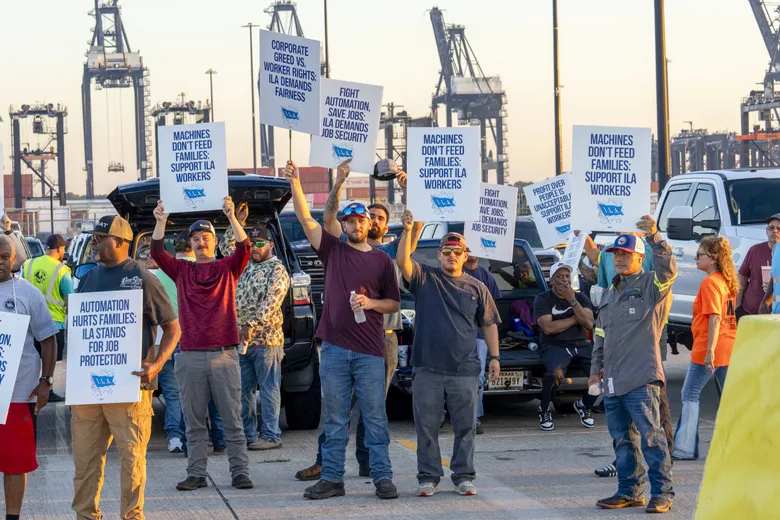NEW YORK/WASHINGTON, Oct 3 (Reuters)– A crushing three-day strike that crippled shipping along the U.S. East Coast and Gulf Coast has come to an end as dock workers and port operators in the United States struck a stalemate Thursday. The agreement — which also offers about a 62% wage increase over six years — was both sides made public, and the affected ports will resume normal operations as of immediately.
Wage increases are expected to push average worker wages from $39 an hour to around $63 an hour over the contract period, sources close to the talks said. International Longshoremen’s Association (ILA) first called for a 77% increase, and USMX had already proposed almost a 50 per cent hike.
Impact and Defeat of Strike” (in-depth explanation).
The strike – led by 45,000 ILA employees – was the largest strike in U.S. history since 1977 and wreaked havoc on the American shoreline. Transportation stopped at 36 ports from Maine to Texas and panics ensued over shortages of commodities such as bananas, auto parts and electronics. On Wednesday, more than 45 container ships were anchored off major seaports.
The draft contract also extends the two parties’ master agreement until January 15, 2025 so that there’s still time to work out outstanding disputes. Among the biggest objections is automation, which dockworkers claim would be costing them their jobs. ILA President Harold Daggett had previously blasted companies such as Maersk and APM Terminals for refusing to stop port automation projects.
White House Intervention
The Biden administration provided a crucial role in negotiating the preliminary settlement. The deal was lauded by President Joe Biden as “a critical step toward a good contract” and once again “teamwork wins the day”. The White House had fought the pressure by corporate interests and Republican legislators to escalate the strike in order to alienate unionists before the Nov. 5 presidential election.
Behind-the-scenes, the White House Chief of Staff Jeff Zients led rousing morning virtual conferences with port officials and shipping lines in which he emphasized the need to reopen ports as hurricane relief moves into the southeastern United States.White House economic adviser Lael Brainard and Acting Secretary of Labor Julie Su helped negotiate the new pay increases that sealed the deal.
Economic Concerns
It is also a victory for the U.S. economy, which had been bleeding out an estimated $5 billion a day in losses, according to JP Morgan analysts. The port shutdowns had initially kept consumer prices at bay, because companies had hoarded commodities in anticipation of problems. But economists had pointed out that a prolonged strike could eventually have led to the spike in food prices and other inflationary pressures.
Experts welcomed the incipient settlement. The National Retail Federation called the settlement “great news for the country’s economy,” adding that it was crucial to reach an agreement for American families. In a similar spirit, National Association of Manufacturers CEO Jay Timmons hailed the resolution as a “win for all parties involved” and an effort to save jobs and protect supply chains.
Next Steps
While the compromise will suspend the strike until January 2025, the parties will head back to the bargaining table to address remaining concerns prior to the expiration of the long-term contract in January 2025, and normal port services will be restored at a welcome moment for industries dependent on delivering their goods on time and states that are struggling with recent hurricane conditions that hit the southeast.
The port strike and its eventual abatement reveal how U.S. labor and supply chains are struggling to keep up, and illustrates how workers and the economy must remain in tension.
References
- Reuters
- National Retail Federation
- Maersk
- APM Terminals
- White House
- Labor Department
- Everstream Analytics
- JP Morgan
- Morgan Stanley
- National Association of Manufacturers
- National Retail Federation
- Everstream Analytics

